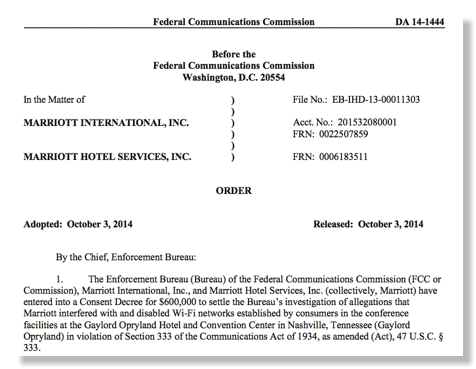Marriott Pays $600k Penalty for Wi-Fi Jamming in One of Their Hotels

As shown above, FCC released an Order on October 3 terminating an investigation of jamming of Wi-Fi signals at a Marriott hotel by the hotel management with a $600,000 penalty payment. (Until recently such payments were classified by FCC as “voluntary payments” and were tax deductible by the perpetrator - no longer so!)
The press release states
The FCC Enforcement Bureau’s investigation revealed that Marriott employees had used containment features of a Wi-Fi monitoring system at the Gaylord Opryland to prevent individuals from connecting to the Internet via their own personal Wi-Fi networks, while at the same time charging consumers, small businesses, and exhibitors as much as $1,000 per device to access Marriott’s Wi-Fi network.
“Consumers who purchase cellular data plans should be able to use them without fear that their personalInternet connection will be blocked by their hotel or conference center,” said Enforcement Bureau Chief Travis LeBlanc. “It is unacceptable for any hotel to intentionally disable personal hotspots while also charging consumers and small businesses high fees to use the hotel’s own Wi-Fi network. This practice putsconsumers in the untenable position of either paying twice for the same service or forgoing Internet accessaltogether,” he added.
A Washington Post article on the episode was titled “FCC to Marriott: No, you can’t force your customers onto terrible hotel WiFi”. It gives Marriott’s side:
Marriott, in a statement, insisted that its actions were legal and designed to thwart "rogue wireless hotspots.""Like many other institutions and companies in a wide variety of industries, including hospitals and universities, the Gaylord Opryland protected its Wi-Fi network by using FCC-authorized equipment provided by well-known, reputable manufacturers," Marriott said. "We will continue to encourage the FCC to pursue a rulemaking in order to eliminate the ongoing confusion resulting from today's action and to assess the merits of its underlying policy."
Of course, Marriott also sells its own WiFi access for $14.95 a day, sometimes charging for multiple computers in the same room. (It amuses you blogger to observe that cheap hotels such as Quality Inn and Motel 6 generally give free Wi-Fi (often breakfast, too) and charge lower rates than Marriott.
The initial complaint in this case came in March 2013, so the case went from compliant to resolution in 19 months. While this might not seem fast to some, it is much faster than past practice and considering the technical and legal issues involved a timely resolution for string a new precedent a rather timely resolution.
The legal basis for this FCC action was § 333 of the Communications Act , 47 USC 333, a recurring topic here in the context of prison jamming of contraband cellphones. Here is the text of the section:
47 U.S. Code § 333 - Willful or malicious interference
No person shall willfully or maliciously interfere with or cause interference to any radio communications of any station licensed or authorized by or under this chapter or operated by the United States Government.
Clearly Marriott’s action violated this prohibition. While the user’s Wi-Fi system was not “licensed”, it was “authorized” by FCC. Unfortunately, the cellular industry consistently misreads § 333 and tells FCC it means that FCC has no authority to authorize jamming of contraband cellphones in nonfederal prisons, an issue closely related to Docket 13-111.



![Validate my RSS feed [Valid RSS]](valid-rss-rogers.png)

